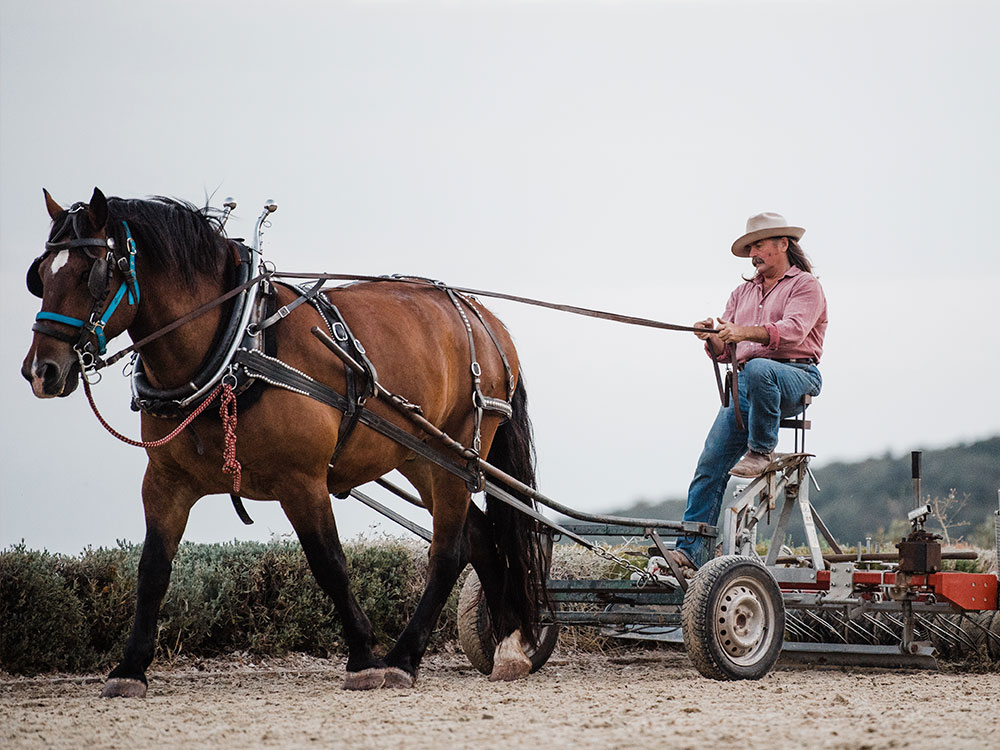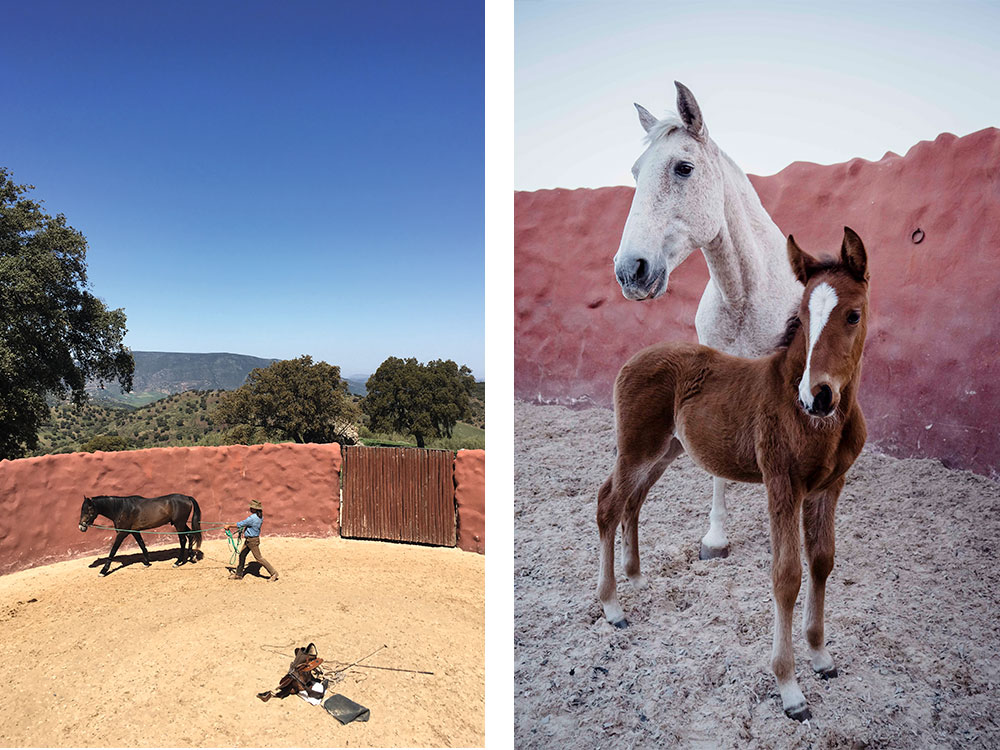INTERVIEW WITH LA DONAIRA’S OWN COWBOY SEAMUS GAFFNEY

Part 1: The Early Years
Seamus Gaffney has been a part of La Donaira from its inception. He has been working assiduously for the past 12 years building trustful relationships between man and horse, according to the principles of natural horsemanship, also known as natural dressage or horse whispering. An indomitable spirit with a big heart, we talk to him about his life’s journey and how he ended up becoming an integral member of La Donaira’s core team.
LD: Can you talk to us about your childhood and what was your first contact with a horse?
Seamus: I come from a place called County Cavan, in the Northern part of Ireland. I was born in 1953 and Ireland hadn’t changed much in a hundred years. The working people and small farmers like my family used burros (donkeys) for all the work of transportation, hauling, fuel, milk, anything. Horses were used just for ploughing. We weren’t very well off and we didn’t own our own plough horse so we used to loan a plough horse from the next door farmer when he had finished using it. If you did well then you bought a plough horse.
LD: Was owning a plough horse a marker of wealth?
Seamus: It would have been in a sense where you were doing well if you had a couple of plough horses. But we’d always have donkeys, maybe a pony, but it was normal, it was the 1950’s rural Ireland and I remember the village that we were from. When I go back to Ireland, of course everything has changed and you don’t see any donkeys any more but I can squint my eyes and I remember all the donkeys and carts being tied outside usually at the bars after market days, so in my short life time I’ve actually seen Ireland as it would have been a hundred years ago. The only people that had cars then were maybe doctors, and land agents and people like that.
LD: How old were you when you started working with horses?
Seamus: My first job was doing a milk round in Ireland with a horse when I was very young, 8 or 9. But that was again normal, we didn’t have cars or trucks and we used horses. I didn’t think there was anything special about that. That’s what it was. I collected big cans of milk on a flat bed carriage, about 8 cans and I had to lift them up as a young thing. They were as heavy as you are, at 6 o clock in the morning by the way. Seems like I’m making a sad story but its not, that’s just the way it was. We were working people.

Photo: Lena Saugen
LD: Did you get paid?
Seamus: I don’t really remember but I know I had to do it. You did it before you went to school. My father would lend us out and it would be repaid in kind. Small farmers and people helped out and children were expected to work. My mother used to drive when my grandfather had an accident, she was 8 or 9 years old. After returning from school she would do a lot of work with the donkeys, taking fuel from the fields back to the house. Its what life would have been like in many many European countries in the 1880’s. Remember, Ireland never had an Industrial Revolution. We were a rural country right up to I would say the 1970’s and then it changed dramatically.
LD: When, and why did you leave Ireland?
Seamus: We left, when I was in my early teens. We left because of poverty, we felt poor. Well, my father did. He didn’t want to be a farmer, he wanted to go to America but instead of going to America we went to England because it was closer. For hundreds of years people had been crossing the Irish Sea for seasonal work and coming back, but of course lots stayed in the big cities in England. The irony is that we were rural people, but we went to the cities and then we built the railways and the motorways and it´s a whole history of Irish labour.
LD: Was your father working in the railways?
Seamus: He was, and a lot of underground work when the undergrounds were being built and that was terribly hard work. But then I suppose if you compared with maybe getting 5 pounds a week in Ireland in 1955 and you cross over the water and you get 20 or 25 – it sounds nothing now, but it was a big thing then. Anyway, thousands and thousands of Irish people, I think from 1950 to 1960, as many as 60 000 Irish people under the age of 25 were going to work in England which was a bit of a shame for Ireland actually.
LD: And did you feel less poor when you were there?
Seamus: I didn’t feel poor at all in Ireland because it was our community and we played our games, there were a lot of great characters and it was a lot of fun aside from the hard work.
LD: How was it for you moving to England?
Seamus: Horrible, I hated it. I remember the first scene seeing my first ship, well not my first one but certainly my first time on a ship crossing the sea and then everything was grey because the trains were all steam trains and just the sounds it made were awful. I just remember seeing everything grey and that was my first impression.
LD: Did you knew you were leaving?
Seamus: I didn’t know we were leaving for good. It was always “we are going for a while” but I’d go back home every summer when my grand parents were alive and I never wanted to come back but then your life starts over there and it was a different life. Once my father had tasted the delights of London he didn’t really want to go back to being a small time farmer in rural Ireland. It´s an old story, people go to the cities and then of course you don’t see it but the rural life is dismantled. Ireland as a country was a monoculture for probably longer than a lot of other countries so that gave it its character and now I feel I’m a foreigner when I go there. I’m a foreigner everywhere.
LD: So in your early teens you were in London, were you working there with horses?
Seamus: No, I went into the butchering trade because my grandfather was a butcher and I wasn’t in school any longer. My school had ended at 14 so my father went “does that fellow have a job yet?” and my mother got me into a butcher shop. No education, stuck in another country and had to get on with whatever came up. I had to earn money. My father had a black sense of humour, or an Irish sense of humour, and he would call me the lodger. He said to my mother, “has the lodger paid his rent this week?”, because I had to give her some money. That was the start of my working career and I’ve done many other things besides that.
To be continued…
In the next instalment we will go through Seamus’s working career in the United Kingdom and Latin America.

Photo: Anna Maria Indra
Main Photo: Lena Saugen




